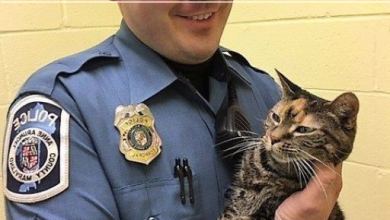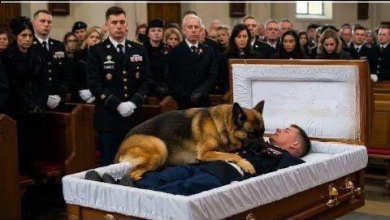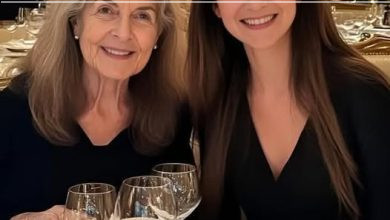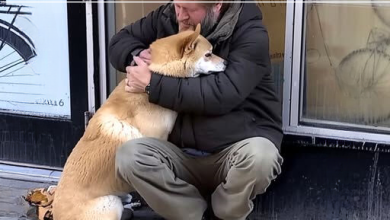HE NAMED HER BUTTONS—BUT WHEN THE TRUCK ARRIVED, GRANDPA COULDN’T MEET HIS EYES
Buttons wasn’t meant to be special—just another spring calf. Wobbly-legged, curious, always nibbling on Ezra’s hoodie strings. But from the moment she was born, my son bonded with her instantly.
Every morning, Ezra pulled on that faded “SUPER 08” shirt and bottle-fed her before school. In the afternoons, he ran straight from the bus to see her, thrilled by every new thing she learned. “She follows me now!” he beamed once, like she’d handed him the world. Their little crew—Ezra, the dog, and Buttons—was inseparable.
And I should’ve warned him sooner.
Buttons wasn’t ours to keep. We couldn’t afford to. She was being raised for someone else’s auction. Ezra had no idea. He thought loving her was enough.
Until today, when the livestock truck rumbled up the drive.
Ezra stood with Buttons and the dog, rope in hand, smiling for a photo. Then the man stepped out—boots, gloves, clipboard—and Ezra’s smile faltered. He looked at me. Then at Grandpa, who suddenly found the grass very interesting.
“Dad,” Ezra asked, barely above a whisper, “why is he here?”
I had no words.
Grandpa muttered, “He shouldn’t’ve named her,” and turned away.
Ezra stiffened. The rope in his grip tightened. Buttons nuzzled his leg.
The livestock agent, Mr. Hargrove, greeted us, talking paperwork, sidestepping the reality we were all trying not to face: we were about to lose her.
Ezra pulled Buttons closer. His cheeks flushed, not with anger, but confusion. Panic. “No,” he whispered. Then louder—“No!”
I reached for his shoulder. “Ezra—”
“She’s mine!” he cried, voice cracking. “You can’t take her!”
“She isn’t ours,” I said gently, hating the truth. “We were just caring for her…”
“Until someone buys her?” he asked, tears rising. “Where will she go?”
I couldn’t answer. Grandpa stayed quiet. Mr. Hargrove shifted uncomfortably.
Ezra dropped the rope and ran—not toward the house, but toward the woods. Buttons bleated, trying to follow.
“Should I go after him?” I asked.
Grandpa finally looked up, worn and heavy. “Let him have a minute.”
But I couldn’t. I told Mr. Hargrove to wait and chased after my son.
I found him beneath the oak tree, hugging his knees, tear-streaked. Buttons stood nearby, as if she’d always known to follow him.
I sat down beside him in silence.
“Why do they get to decide?” he finally asked.
“They own her,” I said quietly. “It’s their decision.”
“But I’m the one who’s been loving her,” he said, voice raw. “Doesn’t that matter?”
More than anything, I wanted to say yes—that it mattered more than money, more than contracts. But life doesn’t always work that way.
So I said, “It matters more than you know. You gave her a name. You gave her a family.”
He leaned into me. “What now?”
“We take care of her the best we can. And when it’s time, we let her go the right way. She’ll never forget you. Animals remember love.”
Eventually, we walked back. Grandpa had spoken to Mr. Hargrove. “Told him we needed more time,” he said, not meeting Ezra’s eyes. “He’ll wait another month.”
Ezra blinked. “Really?”
Grandpa gave a small nod. Ezra hugged him hard. Grandpa stiffened, then slowly patted his back. “Alright, alright,” he muttered, but I saw him smile.
For the next month, Ezra and Buttons made the most of every moment—racing through the pasture, basking in the sun. I captured every laugh, every hug.
Then came the day.
A new truck arrived, driven by Clara, the woman who’d be giving Buttons her forever home. She was kind, warm, and promised Buttons would be safe and free among other cattle.
Still, goodbye was hard.
Ezra clutched the rope. “Take care of her,” he said, his voice breaking.
Clara crouched down. “With all my heart,” she said.
As Buttons walked onto the trailer, she turned back, locking eyes with Ezra one last time.
Ezra stood still, silent tears running down his cheeks. I put my arm around him. No words needed.
Weeks passed. Ezra stayed busy. But every night, he sat on the porch, staring toward the field she used to roam.
One morning, a package arrived from Clara—a framed photo of Buttons grazing under open skies, surrounded by green fields. On the back: “Thank you for loving her.”
Ezra stared at it for a long time before hanging it above his bed.
Later, watching the sunset, he leaned into me. “Do you think she remembers me?”
“I know she does,” I said. “Love never really leaves.”
He smiled, the kind that finally reached his eyes.
And that’s when I realized: real love doesn’t cling. It lets go—with care, with grace, and with a memory strong enough to last forever.




